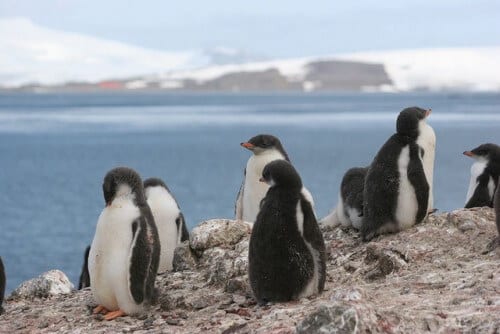Mongamy is not that common in nature

In many species, pairing is a permanent relationship between the couple, but it turns out that even in the more famous and known to establish monogamous relationships, the picture is different...
In human society (in most cultures) monogamy is considered an important value, but out of about 5000 species of mammals, only about 4% are considered to be those that maintain a permanent relationship over long periods of time. In this small group, the following occupy a prominent place: beavers, nutria, wolves, foxes, several species of bats, and several falcons (also several species of birds). But it turns out that even those who are considered monogamous (who do not change partners as long as both partners are alive) are not always "faithful". Loyalty has a heavy price (in most species), males are "programmed" to spread their sperm, females are looking for the best father for their offspring, the price of monogamy is high since it means "all eggs in one basket", all of Zweig's strength and energy is invested in his partner and hence great pressure on choosing a partner. From human experience such a choice is not easy.
In light of recently discovered facts, the monogamous relationship is divided into three types:
1- Sexual monogamy - sexual relations / reproduction with only one partner,
2- Social monogamy - pairing of couples for the purpose of reproduction and raising offspring at the same time
"extra-pair copulations"
3- Genetic monogamy - when DNA tests shows that the offspring have only one father.

For people, sexual and social monogamy (1+2) go together, not so with mammals / other animals, there is an estimate that 90% of all birds form social monogamy bonds - each pair raises its offspring together, but at the same time many of the partners have relations- Sex with other partners.
One of the most notable experiments showed that release females that mated with infertile males laid fertile eggs that hatched into healthy chicks.... Gibbons and swans, were considered an example and symbol of marital fidelity... it turns out
Because they also have "betrayals", abandonment and even "divorce"... Wolves, which are considered a symbol of loyalty, do not "waste" any time at all - as soon as one of the partners "doesn't function", the other partner will look for a "replacement",
Those individual species in which monogamy is preserved provide science with valuable information about the basis and the biological advantage for fidelity (if there is an advantage?), one of the researched is the "Nebern-Araba" (a small rodent), the male will prefer to mate only with the female to whom he "lost his virginity" Therefore, he will violently and jealously drive away any other female from his environment and thus keep his faithfulness (forever?) It turns out that this behavior is dictated by the "interneuronal transmitter" dopamine, (one of the causes of drug addiction in humans) Another species that jealously keeps faith is the eagle- Black (Central America), so much so that neighboring pairs attack a pair of neighbors, in both cases (and in others) the jealous monogamy contributes to the growth of the offspring, in the henbarn cannibalism is common, when the two partners always together protect the young, in the eagles both partners incubate and feed the chicks that require a lot of food for a long time and therefore two food providers contribute to their survival, researchers continue and remove the lot from the reasons for monogamy, as they continue to research they look for the advantages in the species that maintain monogamy, when the accepted assumption is that "monogamy developed in a situation where the offspring have better chances of survival when two The parents are involved in their upbringing", an assumption that is not appropriate when examining, for example, the dik-dik (tiny African antelope), the dik-dik lives in monogamous couples that remain faithful throughout life. When one of the partners dies, his partner will remain alone until his death... but the male dik-dik Does not help at all in raising the young, so where is the advantage? Therefore, in an overall view, monogamy is not seen as an advantage.
The accepted assumption explains the tendency to monogamy in the human race - since children grow slowly - many years until maturity and independence, years in which the child needs care and supervision, which is done better when both spouses share the task? So why aren't chimpanzees, orangutans and gorillas monogamous?
In light of the recent "revelations" about homosexuality in animals (in nature and in zoos) and in light of the accepted assumptions about polygamy in nature, monogamy remains a clear/simple situation, a simplicity that does not facilitate the explanation of the benefits.
More of the topic in Hayadan:

4 תגובות
In the movie on TV that I just saw, it was about a wolf living in captivity in Israel. When the female died of disease, the "widowed" wolf did not approach any other female.
Assaf, why didn't you say the things (about the paragraph in question) simply?! And why did you have to attack those studies?!
"A good Jew, answers questions"!
Danny's response because of the paragraph that opened the list,
(and downloaded by the editor with my consent),
A paragraph in which the phenomenon of monogamy was mentioned without expressing an opinion,
There was nothing in the paragraph against homosexuality, but an allusion to the unreliability of studies conducted on the phenomenon under unnatural conditions in zoos and the inappropriate use of these studies by interested parties....
Researchers are trying to show that different gestures of animals in nature express
Homosexuality, usually it's not like that.
In the body of the list I did not express an opinion on the phenomenon, therefore:
In my opinion, as an ecologist who recognizes the explosion of the human population as one of the main causes of damage to the environment, the phenomenon is positive!
Despite being a deviation, humanity also used other deviations for the better,
Either way, I don't need permission to express a personal opinion!
Homophobia under scientific cover.
In this article, which purports to talk about monogamy in nature, disturbing comments were inserted, without any direct connection to the subject of the article, in which the author of the article reveals his homophobic attitudes. This without reference to the "facts" he defies, and with a demonstrated disdain for the "recent revelations" (quotes in the original) regarding homosexuality in nature.
If the article talks about monogamy in nature, what does it have to do with the author's positions against homosexuality?? Admittedly, it is the author's right to argue against the facts known to biologists regarding the existence of homosexuality in nature, while bringing other facts and evidence for his claims. The author, Dr. Assaf Rosenthal, does not act this way. He chooses to discuss another topic: monogamy in nature, and throw out comments that are not related to the topic of homosexuality, without any reference. What is the connection between monogamy and the latest research on homosexuality in nature? It seems that the author is taking advantage of the stage which was given to him by the website "Hidan" for the purpose of a pseudo-professional article accompanied by irrelevant homophobic arguments and arguments.
I'm sorry for the "Hidan" website, which fell into the trap and gave a platform for homophobia, ignorance and hatred, under supposed scientific auspices. Let the readers judge the "science" of the article and of its author Dr. Assaf Rosenthal. Danny.